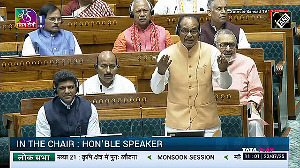'In India, most funds have one or at most two platforms, but we are the only one which has four -- growth equity practice, real estate practice, a special situation and credit platform, and infrastructure.'
Illustration: Dominic Xavier/Rediff.com

With India becoming attractive for global private equity funding, ICICI Venture Funds Management Company, one of the oldest players, has revamped its strategy and has been in the forefront of stressed asset sales as well as big deals.
Prashant Purker, managing director and CEO, who took over the reins of the ICICI Venture Funds Management Company more than three years ago, unravels his game plan for the first time, in an interview to Surajeet Das Gupta.
With global PE funds making aggressive moves in India and the private equity space getting attractive, what has been your performance in terms of assets under management, and new investments and exits?
Our AUMs are $5 billion, of which foreign capital has accounted for over 70% of our AUM growth in the past nine years.
We believe this is the largest tally among Indian private equity funds.
Each of our current verticals will scale up to a few billion dollars by leveraging foreign and Indian capital.
What about your record on exits and new investments?
We have concluded 70 exit deals worth $2 billion since 2009 alone, at a rate of 5 to 10 exit deals per year between 2009 and 2018.
Last year, our exits were worth $350 million and our investments were around $600 million.
We believe we have the highest exit tally in the Indian market during this period and the most consistent in good and bad times.
This has been possible because we have utilised diversified exit strategies and not relied on capital markets alone, which have seen good times and delivered good liquidity for private equity funds over the past 3 to 4 years.
What have been your returns on investment?
Returns vary across our verticals depending on the fund thesis.
For instance, in our PE vertical, most of our recent exits have been in the 30 per cent IRR (internal rate of return) range. In our real estate vertical, the last fund exited its debt portfolio at a 22% IRR.
Many would say global PE funds have been much more aggressive in making big deals while you have been conservative. What is your average deal size?
Our typical investment ticket size varies across verticals and thesis.
Currently in PE, it is $30 million to $50 million.
In AION, it is $100 million to $200 million equity although we have done much larger deals, using co-investment.
In Resurgent, it is $100 million to $200 million, which can be expanded using co-investment.
In affordable housing debt, it is Rs 50 crore to Rs 100 crore (Rs 500 million to Rs 1 billion) as projects are small.
In 2018, we did our three biggest deals ever -- two investments and one exit: Monnet at Rs 850 million, Prayagraj at Rs 850 million and Star at Rs 925 million.
Also, we are not in competition for market share in this business.
What matters are good returns for our investors.
The power sector has been under stress. However, you seem to be cautious despite the fact that a lot of assets are available.
We have been very cautious in Resurgent because the resolution framework has taken some time to evolve and perhaps at a slower pace than in the steel sector.
But we are quickening our pace.
Your strategy has been to go with alliances and joint ventures rather than always doing it on your own. What is the thinking behind this?
Our basic philosophy is to be a multi-practice alternative investment fund platform, with dedicated specialist teams in each part.
In India, most funds have one or at most two platforms, but we are the only one which has four -- growth equity practice, real estate practice, a special situation and credit platform, and infrastructure.
The JV route has business logic.
In AION, Apollo brings its global expertise in stressed and distressed investing.
In Resurgent, Tata Power brings its O&M expertise in the power sector.
What are the other areas where you see potential for alliances for you?
While I cannot say anything definitely because we keep evaluating opportunities, there is scope in roadways, venture capital and small and medium enterprises.
In real estate our latest fund is in affordable housing, where we offer debt and we are getting a great response.
Some of these areas are or will be run independently run by us.
In some cases, it might be a joint-venture approach.
These are at a nascent stage.
Many PE funds have not been happy with the way the Insolvency and Bankruptcy Code process has panned out. What are your thoughts on this?
We are among the first movers and that is a big advantage.
We do not share the view that the IBC process been disappointing.
I believe the IBC and the related process on resolution have been one of the most signature reforms of the government.
The regulation has to go through modifications.
From an investor's point of view, we believe this is likely to be also a very profitable opportunity.
Have you also been consciously not looking at sort of new areas of service industry like e-commerce, space at all?
In areas like e-commerce you require different cheque size, different burn rate and so on and it also requires a dedicated fund which can invest in a large number of them and invest continuously.
We are not in that play.












